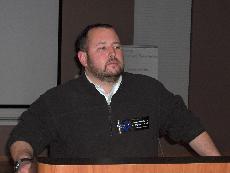In response to rising death tolls in the Gaza Strip, Hillel invited Rabbi Ben Packer to speak in the community center on Jan. 21.”We decided to hold this discussion when our school did nothing to educate students about it,” said Joseph Fox, co-president of Hillel. “Remember when the economy collapsed and Guilford had a group of top faculty from the school discuss it? I wish Guilford would have done something for this situation. The fact that it was lacking is atrocious.”
Members of Hillel arranged for Rabbi Packer, who served in the Israeli army as a combat soldier in the Gaza Strip, to hold a two-part event starting with an hour-long presentation of a condensed history of Gaza. He discussed the significance of its location as a historical trade route and its earliest religious connections to the current waves of cease-fires and violence.
A group of approximately 60 students, faculty, staff, and community members absorbed the information, though afterwards, some commented on the partisan nature of the historical account.
“I don’t believe in objectivity; his telling of the history was accurate for the most part, except he left out some specifics,” said Maria Rosales, assistant professor of political science. “Some examples are exactly how Israel was created and the fact that there is a huge population of Palestinian refugees.”
Fox, however, said that in planning the event they wanted Rabbi Packer to be as non-biased as possible during the history portion.
“He accomplished it beautifully,” said Fox.
Eric Mortensen, assistant professor of religious studies, praised Hillel for doing “a fine job of bringing to campus someone who endeavored to present as objective a history of Gaza as possible.”
“The presentation of the history of Gaza was fundamentally excellent and informative, but as his timeline approached the last fifty years, his editorial choices of what and how to present his version of history were undeniably biased, and misleading,” said Mortensen.
When people began to ask questions during the hour-long Q&A, tensions arose, especially when Rabbi Ben stated that though Hamas’ rockets were intended purely for civilian targets, he does not believe that Israeli soldiers ever intentionally killed civilians.
“Mistakes happen and people die,” he said.
Junior Nida O Khalaf, a “Palestinian woman independent of any political parties,” brought up how a rocket hit the Ramallah Friends School that she attended in the West Bank.
“You would be right if this was one incident; a mistake is one incident,” she said.
Later in the session, after many people in the audience expressed concern over reconciling security and politics with the moral issue of violence, Mortensen posed the question of how the Rabbi would feel if the situation were reversed, in terms of casualties. After Rabbi Packer responded, Mortensen walked out after listening for two hours and ten minutes.
Reflecting on this later in an email interview, Mortensen said: “He explained that he thought it was preferable to inflict one hour of violence on the Palestinians in Gaza so that the Israeli’s would suffer zero. At that juncture I walked. He crossed a basic human line of decency, in my opinion, and I felt that it would be immoral of me to continue to justify his presence as a speaker with my endorsement that his words held humane value.”
The interactions between Rabbi Packer as well as people in the audience highlighted the tension between differing views, in which so many people have personal stakes.
“It’s a difficult situation because Israel had no other choice-it had to defend its citizens, but it’s also not good to have unintended casualties,” said sophomore and Hillel member Bern Glasser in a later interview. “The important thing to remember is that Hamas is hiding behind its people. One of their headquarters is under a hospital. I agree with going after Hamas because it’s a terrorist organization, but I don’t necessarily agree with having civilians being affected to the extent they were, so I agree with the Rabbi about 98 percent.”
Agreements and disagreements between many in the room instigated raised voices when the issue of abuses at checkpoints surfaced.
O Khalaf, who challenged Rabbi Packer by saying that she did not have open access into Gaza as a Palestinian, discussed this conversation in a later interview.
“I have never been to Gaza and when he talked about how it was legal for me to go there in 1999, even if it was, we would have literally been treated like pigs stopping at checkpoint to checkpoints for soldiers to inspect us and our cars,” said O Khalaf.
Rabbi Packer’s response to her was, “what would Israel say? Is it for security or not?”
At this point, Jada Drew Interim Africana Community Director reminded the audience that the purpose of the discussion was supposed to promote learning and talking over others was preventing that from happening.
Despite the amount of information presented, as well as the opinions of audience members during the Q&A session, some felt lost about where they stand politically on the issue.
“On one hand I am Jewish and everyone I talk to who is pro-Israel tells me how Hamas wants me dead or something extreme along those lines,” said sophomore Ben Macdonald. “On the other hand when I hear about the things that are going on I question it all on a human level. I keep hearing everything from a second hand source, whether it be the news or someone who is having a presentation.

